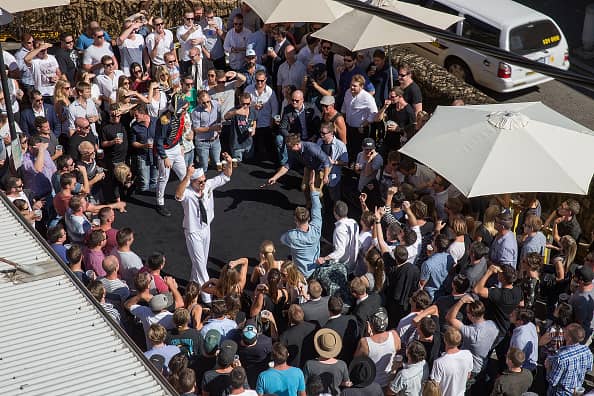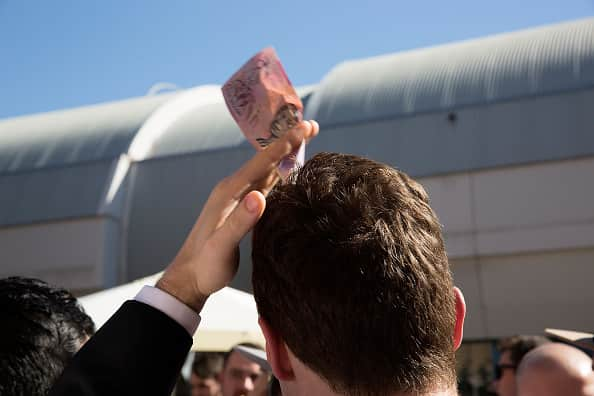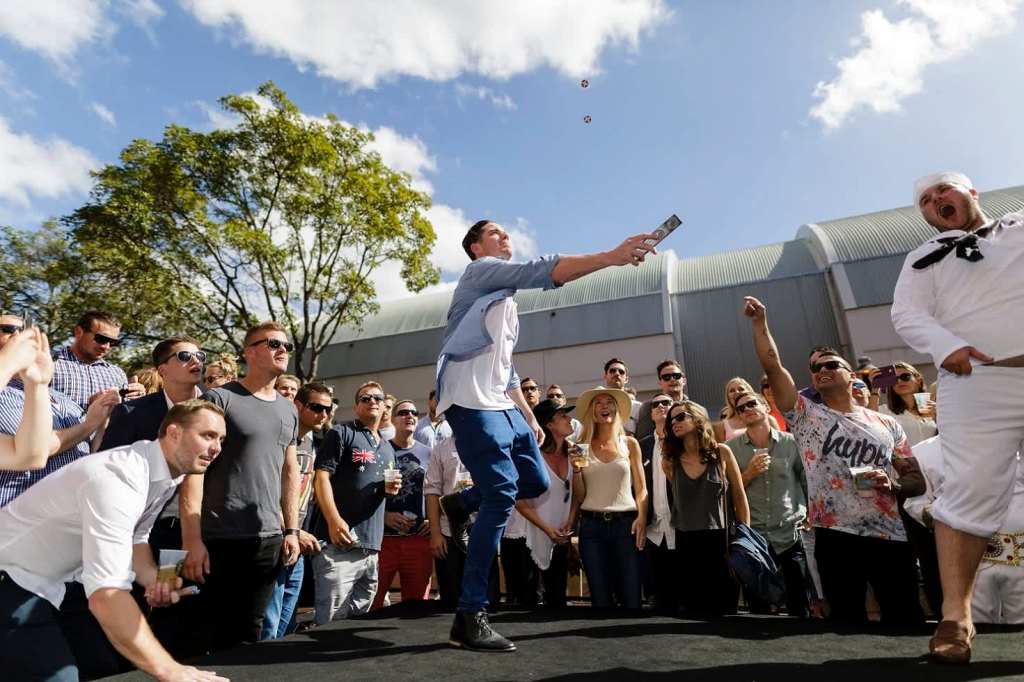Two-up is amongst the greatest of Aussie traditions. Much like muck-up day, goon of fortune, and the Bunnings sausage sizzle, two-up is one of those bizarre Antipodean quirks that make up the rich tapestry of Australian culture.
Played with two coins, a paddle, and a crowd of beer-drinking revellers, two-up is effortlessly simple and endlessly fun. On one sacred day each year, the paddle is dusted off and the crowds descend on their local watering hole, ready and willing to chance it all on the flip of the coins.
Depending on your interpretation of ANZAC Day, two-up is either your go-to pastime or something that detracts from the solemnity of the day. Most people land somewhere in between or don’t spend nearly as much time thinking about it as I do. However, as the game itself is a tradition descending from ANZAC troops, it’s got historical precedent as a valid ANZAC Day activity.
If you’ve never played, it’s worth giving it a go this year. Not only do you get to hang out with your friends in the sun (fingers crossed), but you also get to engage in a little bit of ANZAC tradition.
Come in, spinner!
What Is Two-Up?

Two-up is a traditional coin-flipping game with money wagered by observers on the outcome of the flip. It draws big crows on ANZAC Day and usually goes on from midday until sunset.
It’s a fun way to spend an afternoon once a year, with connotations of remembrance and respect for fallen soldiers. However, the game is inescapably just gambling, something Australia has a bit of an issue with.
While gambling is typically given free rein in Australia, two-up is actually categorised as “illegal gambling” under most state and federal laws since it is unstructured and played without official regulation. Therefore, two-up is mostly banned throughout the rest of the year. Technically, you can play it in Broken Hill and at race meets in regional WA and the NT as well as a few casinos in Perth, Melbourne, and Darwin.
Most states have rewritten their gambling laws to allow the playing of two-up on ANZAC Day alongside a few others. In NSW, The Gambling (Two-Up) Act of 1998 allows the game on ANZAC Day, Victory Day in the Pacific, and Remembrance Day. ANZAC Day is however the big one and the day most associated with the game.
Why Do We Play Two-Up?
Two-up is a game that goes back to Australia’s gold mining days. In the mid-1800s you would have seen people in mining towns flipping coins and taking bets as a means of gambling and having fun.
It probably got its start from Irish and English immigrants coming to the country to seek their fortune, but was also noted as being popular amongst convicts as early as 1798.
When the soldiers went off to Europe to fight in WWI, two-up went with them. It’s an easily accessible game requiring very little equipment to play. They might not always have had a deck of cards, but finding two bits of metal to flip and a paddle or “kip” to throw with wouldn’t have been hard.
Michael Annett, the secretary of the Victorian Branch of the RSL, told triple j: “Australians, as we all know, would bet on two flies crawling up a wall.”
“When men came back from the war, particularly after the First World War, it found its way into the RSL clubs and sub-branches that were established and [two-up] became a game very much associated with old mates getting together on Anzac Day,” Michael explained.
As it was played by the soldiers, the game got wrapped up in memorial traditions of honouring those fallen in conflict. As ANZAC Day is the biggest such day, held originally to mark the first landing at Gallipoli in modern Turkey in 1915, playing two-up became synonymous with remembrance.
How to Play Two-Up

The game itself is a little complex and can be intimidating for first-timers, especially if you walk into an in-progress game and no one explains just what the hell is happening.
Essentially, playing two-up means you are betting with other people around you on how two coins will land. Anyone can join at any time and you don’t have to continue playing afterwards (though you’ll probably want to).
A designated “spinner” – the person flipping the coins – stands in the middle of the ring surrounded by players. They hold a paddle or “kip” with two coins on it and throw the coins above their head which must then spin and land in the ring. Special coins are often used which are tailor-made for the game.
There is a ring keeper or “ringie” who acts as an MC during the event, announcing the flip of the coins and generally bantering with the crowd. People in the crowd typically take turns being the spinner, with anyone allowed to flip the coins.
Before the flip, players make bets with each other on how the coins will land and, when all bets are in, the spinner throws the coins – often to the roar of “come in, spinner!”
There is no central authority in charge of the betting – if you want to make a bet, you hold up cash and shout your bet into the crowd. You can bet one of two ways; hold your money on your head to bet on heads, or by your bum to bet on tails. Someone with an opposing bet will match you and, once all bets are matched, the coins are flipped.
For example, you want to bet $10 on the next flip of the coins landing on heads. Hold $10 cash by your head and shout “heads!” Someone who thinks the coins will land on tails will say “tails” and typically they will hold both your money and their money until the coins are flipped. If you win, they’ll give you the whole $20, if you lose, they keep the money. It’s a remarkably trusting system but it works.
Coins can either land both on heads, both on tails, or “odds” meaning heads and tails. If the coins land odds, they are flipped again and again until a match is shown. If the coins land on odds five times, this is called “odding out” and the bets are reset, though often the game will just continue until a match is shown.
It’s worth noting that some variations of the game play with three coins, so that there can’t be an odd throw.
Once you get the hang of it, you can volunteer to be the spinner. The spinner must bet and generally bets heads. The spinner stays on until they lose a bet, at which point the kip is handed to the next spinner.
Any amount of money can be bet, though normally bets are in the $5-$50 range. Sometimes you’ll see bets of $100 plus and it’s not unheard of for people to wager thousands on a single flip.
Where to Play Two-Up
Two-up on ANZAC Day is predominantly a game run in RSLs. Around the country, these institutions will be running games.
However, more and more regular pubs and hotels have been getting in on the action over the past few years, particularly in metropolitan areas.
Sydney has a good offering of pubs hosting the game each year, particularly those with some heritage and a decent courtyard to play in. Melbourne offers the same, but you’ll easily be able to find a game in any of the country’s capital cities.
All of Australia will be getting a public holiday for ANZAC Day this year as it falls on a Tuesday, meaning more opportunities for two-up. However, work will still need to be attended on Wednesday, so probably best not to get too carried away.
If you are going to play two-up, don’t wager more than you can afford to lose. Take breaks so as not to get too caught up in the heat of the moment, and try to avoid “chasing losses.” Sometimes the coins are just not in your favour and no amount of cash can bring them back.
Stay safe, have fun, and good luck.
Related: Asking for Me: Do We Get a Public Holiday for Anzac Day This Year?
Related: Post-Dawn Service, What’ll Be Open That You Can Do on Anzac Day?
Read more stories from The Latch and subscribe to our email newsletter.







